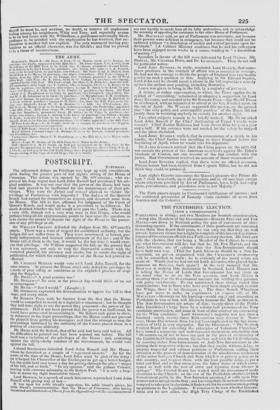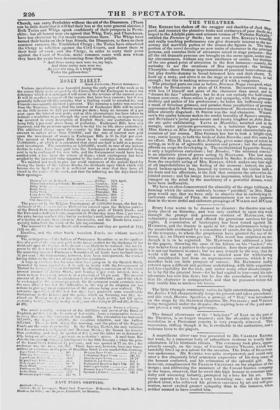THE PERTHSHIRE ELECTION.
[FROM. A CORRESPONDENT.]
PARLIAMENT is sitting ; and two Members for Scottish constituencies, —being also Members of the Government—RommT SrEcAnT and Fox MAcLx—are down in Scotland acting the part of canvassers or elec- tioneering-agents. If the constituents of these gentlemen are contented to see them thus desert their posts, we can only say that they are well served: but every citizen has a right to complain of this brazen-faced inter- ference of' Government officials in a Parliamentary election. Mr. STEuAirr tells the electors, that not being a Member of the Cabinet, he cannot say what Government will do ; but that he, Mr. Fox MAn.R, and the Lord-Advocate, are of opinion that the Non-Intrusionists should have their own way. (That the Lord- Advodite should be a Non -In- trusiouist, no person acquainted with the ('n.txseroust controversy will be astonished to learn : he is evidently of the metal saints are made of. Would that we had our old Lord-Advocate, who played back- gammon on Sure:ays, back again !) At the very moment that Mr.
STEcA la is making this declaration in Scotland, Lord MELI3OURNE is telling- the liaise of Lords that Government has not made up its mind what to do on the Veto question, and Lord MINTo is assuring them that the Government measure for settling thot question will prove satisfactory. To the uninitiated these things sound like contradiction ; but to those who have ever been sh»ple enough to trust the Whigs, there is no discrepaney. The three Scotch Whiglings have got leave to make an experiment, (in corpore rib, as Mr. MACAULAY—blessings ou his learning—would say,) and according as Perthshire is won or lost, will Ministers humour the Kirk or thwart it. The Non-Intrusionists are aware of this : twenty-three of the Perth- shire Established Clergy have by a solemn bull pronounced the Tory candidate unorthodox, and some at least of that Dumber are canvassing for the Whig candidate. Lord Sronsioxfs majority was less than a hundred : surely twenty-three Kirk-sessions may reverse it. More- over, How: DRUMMOND, from having been implieated in the Spy trans- actions of 1S17, is very unpopular. But time Dissenters! " The Scottish 7entral Board for extending the principles of Voluntary Churches," have issued a temperate and well-reasoned declaration, concluding that " Dissenters ought not to have ally part in the present controversy of the Established Church among themselves and with the Civil tribunals, by assisting either Nou-Intrusionists or Anti-Non- Intrusioniets in ob- taining their respective objects ; but that they ought, without delay, to prepare respectful and earnest petitions to Parliament, calling their attention to the process of demonstration of the mischievous tendencies of the union between Church and State which is at present going on in this country, and request them. with the least possible delay, to put a total anti final end. to that connexion, the bitter fruits of whieh corre- spond so well with the root of error anti injustice from whence It springs." The Central Board has waited until the Government ne.Ide overtures to the Church : on the eve of the Perthshire election, (w1n.ch Government perils in the Non-Intrusion question,) it calls upon Dis- senters not to mi n gl e lint he fray; and knowing that idle mcn are irresistibly temp i tal to take port in elections, it finds work for its constituents in getting up petitions to the Logislature. It remains to be seen whether Govern- ment and its new allies, the High Tory Clergy of the Established
Church, can carry Perthshire without the aid of the Dissenters. (There can be little doubt that it st ill feel their loss at the next general election.) Both Tories and Whigs speak confidently of their prospects in Perth- shire : but all honest men are agreed that Whig, Tory, and Churchman, have lost character by the recent transactions there. The Whigs have turned their backs on their best friends, the Dissenters, to fawn on their common enemies, the Established Clergy ; the Tories have stimulated the Clergy to rebellion against the Civil Courts, and desert them in their hour of aced and the Clergy, in order to carry their point against the Court of Session, make common cause with men whom they have for years been denouncing from their pulpits.
" And three merry men were we, my boys, And three merry men were we, As ever did sing, in a triple string, limier the gallows-tree."



























 Previous page
Previous page